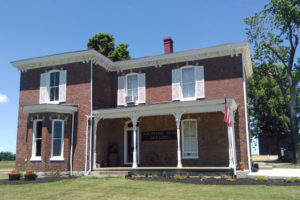By Richard Thomas
The bourbon boom times have brought plenty of new investment into the whiskey industry in the Commonwealth of Kentucky, and along with it have been several new distillery starts. The newcomers have ranged from a handful of crafty nano-distilleries to Bardstown Bourbon Company, a distillery so productive it just might have cracked into the Top 10 list of the biggest whiskey distilleries in America. All but lost in this buzzing hive of activity has been the founding of a new company, one that has bought up some prime real estate while pursuing an unorthodox business model, and all the while eschewing self-promotion.
I first became aware of the project a couple of years ago when Danville’s Advocate-Messenger reported on the acquisition and planning for a new distilling project across the road from Wilderness Trail Distillery. Just months prior, the University of Michigan had voted to pour $130 million into a Canadian-run private equity fund, Toronto-based Waterton Global Resource Management, that started the company behind the Danville development, IJW Whiskey. Whether the University of Michigan’s money is being used for IJW isn’t clear, but it seems likely that at least some of the school’s capital is being applied in this direction.
IJW began building rickhouses on their Boyle County property, but didn’t gain any real attention until they acquired a building on Louisville’s Whiskey Row, a two story structure at 104 W. Main Street that used to be home to Hillbilly Tea. This is meant to become IJW’s headquarters. The company has since expanded their Boyle County holdings as well, adding 13 acres to their existing property, presumably for more rickhouses.
Thus far, IJW has been building just warehousing space and a visitor center. No plans for distillery construction, distilling equipment orders or applications for distilling licenses have been uncovered as of yet, and IJW has been keeping a strangely low profile. The company’s business model instead seems to be buying new make spirit from other distillers, maturing it themselves and then (presumably) bottling it themselves as well.
This model of contract distilling is novel in modern times. Prior to the Bourbon Boom, the “Kentucky Majors” (big distillers) all had capacity to spare and were happy to lease contract production, but said production was often aged at the distillery. Back in the day, the only major exception to this rule was Kentucky Bourbon Distillers (KBP, now known as Willett), who owned a substantial rickhouse complex near Bardstown, but no distillery. If a contract customer didn’t lodge their barrels with the distiller, they kept them with a third party (Old Pogue and Michter’s stored barrels with KBD/Willett).
Contract distilling fell out of favor as demand for bourbon spiked several years ago. The highest profile example of this was when Four Roses let its Bulleit production contract with Diageo expire in 2014; simply put, Four Roses needed all of its production capacity to meet its plans. For a few years, there was virtually no contract production capacity in Kentucky. Then some small and medium-sized producers entered the contract market, while the heavyweight Bardstown Bourbon Company based its business model squarely on contract production.
This approach to the whiskey business differs markedly from what MGP, America’s principal supplier of aged, stock whiskey, does. MGP has a roster of whiskey recipes, and while it may produce one or more of them for clients under contract, the client must choose from the recipe list. In contract production, the client decides most of the details of how the whiskey is made. Michter’s founder Joe Magliocco calls it “cooking in someone else’s kitchen.”
The third model is to buy aged whiskey that is ready or nearly ready to bottle; an independent bottler may store the barrels themselves for a few years, but they don’t need the substantial infrastructure needed to mature their product line from start to finish.
Rumor has it that Wilderness Trail is supplying IJW with new make whiskey at present; when I went down to Boyle County this past spring for a look, what I saw was that their current rickhouses were easily accessed only from Wilderness Trail’s property.
What IJW intends to do with its growing stocks of new and young whiskey is still a mystery. Presumably, the company intends to develop its own brands. An alternative business model would be to become the alternative to MGP in the market for mature stock whiskey, storing a variety of whiskeys from several producers. Both directions could be pursued at the same time, were inventory large enough, and a third source of revenue to would be lease warehousing space to other independent bottlers.
Whatever IJW is up to, however, it’s a capital intensive venture. Laying up large stocks of whiskey to mature for several years is an expensive proposition, tying up potentially millions of dollars in the meantime. This is the main reason why new distillers like High West and Smooth Ambler marketed sources whiskey brands as they built their distilleries and aged their own stocks of whiskey.
This is what makes IJW a substantial, if somewhat shadowy player in Kentucky bourbon. If you do the math on what they have already done, it adds up to a middling-to-large seven-figure investment, and the company is only just getting started.








